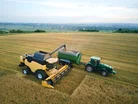Mars and FAO Food Safety Partnership Targets Mycotoxins

Mars has forged a partnership with the UN’s Food and Agriculture Organisation (FAO) to bolster food safety.
The initiatives will see Mars and FAO exchange knowledge and information to support science-based decision-making on food safety. The organisations will develop guidance for increased uptake of the Codex Alimentarius (Latin for 'Food Code') standards and codes of practices by the private sector.
The Codex is a collection of internationally recognised standards, codes of practice, guidelines and other recommendations published by the FAO relating to food, food production, food labelling, and food safety.
The FAO is a specialised agency of the United Nations that leads international efforts to defeat hunger.
One area Mars and the FAO will look at is food allergen management by food operators. It will seek to form best practices around mycotoxin control and mitigation in maize value chains.
Mars and FAO to tackle mycotoxin problem
Mycotoxins are toxic compounds that are naturally produced by certain types of moulds, and grow on foodstuffs such as cereals, dried fruits, nuts and spices.
Mars and FAO will “collaborate on emerging food safety issues, new methods and technologies and trends in research and development that might have impacts on food safety,” Mars said.
Dr Abigail Stevenson, Chief Science Officer for Mars said: “At Mars we believe everyone has the right to safe food and that collaboration is essential as we work together to address food safety challenges.
“This is a great opportunity to share our technical knowledge and scientific expertise in mycotoxin management and develop scientific publications which help to ensure safe food for all.
“Mars and FAO share common objectives with regards to strengthening food safety to enhance food security through capacity building, sharing knowledge and information and development of innovative, science-based approaches.”
She added: Our partnership with the FAO started almost a decade ago and by extending our cooperation, we are helping to raise the bar in food safety for everyone.
FAO Chief Economist Maximo Torero said: “Strong science to support food safety decisions and strong public-private cooperation for food safety are increasingly important to ensure sustainable and resilient agrifood systems.
”FAO and Mars will continue to collaborate to build on work that’s already been done and demonstrate impact and concrete results.”



